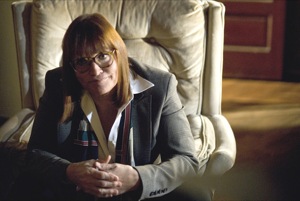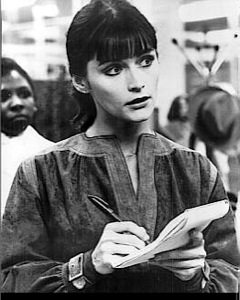Interview
Margot Kidder is nobody’s damsel-in-distress
Published Thursday, 07-Aug-2008 in issue 1076
Margot Kidder’s quintessential portrayal of reporter Lois Lane in the 1970s and ’80s Superman films redefined the damsel-in-distress role, proving the character was as resilient as her superhero counterpart – a trait also shared by the 59-year-old actress.
While Kidder can’t bounce bullets off her chest or thwart hell-bent villains seeking world domination, she’s had to use her own iron-will to battle manic depression.
In 1996, when one manic episode became public, Kidder soldiered on and continued acting, proving she is every bit as strong as The Man of Steel.
The Gay & Lesbian Times talked with Kidder about her turn as Superman’s main squeeze, her days as a scream queen, and her latest role as Dorothy, a tough-as-nails lesbian in the here!TV film, On The Other Hand, Death: A Donald Strachey Mystery.
Kidder also chatted about her life off-screen – her Montana home and the joys of being a grandmother. Before chatting with us, Kidder set up a dunk tank for her grandson’s birthday party, and during the interview, she was gracious, candid and warm.
Nowadays, Kidder says what keeps acting fresh is “that the whole thing of it is fun; it’s different every day – compare that to actually working? It’s just that I love everything about it, I’ve been hooked on movies and movie-making forever.”
Kidder’s love affair with film began in her home country, Canada.
“I was a little girl in mining camps in Canada and in Quebec in those days, kids weren’t allowed to go to the movies,” she said. “So, the only way you got to see movies was when the priest would show them in the church basement. I saw a couple of movies, and one of the bush pilots brought in a movie magazine, and I decided I wanted to be a movie star.
“I didn’t know anything about acting. Then when I was 11, my mom took us kids to New York, and I got to go see Bye Bye Birdie with Dick Van Dyke and Michael J. Pollard, and I sat there and said, ‘That’s what I’m going to do.’ It was just something that I always knew I’d do, and I never let it occur to me I wouldn’t be successful; I was so single-minded and dumb about it, when I was young, I didn’t know there’d be a chance I’d fail – so you just kind of plow ahead.”
What Kidder saw in The Big Apple, buoyed by her determination, launched her to fame as Daily Planet reporter Lois Lane in 1978’s Superman.
Kidder shared why her Lois Lane was different from previous incarnations.
“She was so well-written,” Kidder said. “And that was Tom Mankiewicz, who did the final rewrite, although he’s called a creative consultant – and he brought this fabulous, almost ’30s sensibility to it, so that there was a wit to the lines, and it was amusing on many levels. When you’re given lines as delicious as the ones he wrote for me, you kinda can’t lose.”
Kidder was able to bring her own sensibility to the role, too.
“All I knew to bring to it was, when I was in love with a guy, I acted like a total asshole around him,” she said with a laugh. “And when I had a guy in love with me, who I wasn’t interested in, I was rather curt at full strength. I applied that reality to my portrayal. Luckily, I have no more hormones left, so I don’t have to go back to those days.”
Kidder’s resumé is also peppered with a number of thrillers, including 1973’s Sisters, 1974’s Black Christmas and 1979’s The Amityville Horror – but Kidder didn’t gravitate toward the films.
“I think they are funny, I think horror movies are ridiculous – and if they are not funny, what’s the point in watching them?” she said. “I think I found a niche, when I was very young, as a scream queen. And there are a lot of fans who are passionate about those kinds of movies – so that’s fun at my advanced age to look back and see how things turned out.”
Something Kidder did describe as “horrifying,” was the aforementioned manic episode, which thrust her private struggle into the public spotlight.
“I don’t have any problems when anyone says, ‘What was your most embarrassing moment?’ And you go, ‘Flipping out in public!’ It kind of takes the cake.”
Kidder has used a number of medical treatments to handle her manic depression.
“The way to go about making yourself better is different in every single individual’s case,” Kidder said. “I subscribe to a type of medicine called orthomolecular, in which you see those certain things, emotional swings and thought pattern disruptions, as symptoms of something organically wrong.
“So you find out what it is that’s wrong, and what’s causing those symptoms, and you fix it organically. I am very much not an advocate of what is now mainstream psychiatry, which is basically ‘here’s a one-size-fits-all drug, and let’s just down everybody out.’”
In Kidder’s case, she certainly can’t be kept down. In the last few years, she’s had guest spots on a number of television shows, including “Smallville,” “The L Word,” and “Brothers & Sisters.”
Kidder has also become an outspoken advocate for social justice. The actress is no fan of George W. Bush. She was once quoted as saying, “God, George Bush makes me want to slash my wrists. He’s so embarrassing I have to leave the room when he’s on the news. What a monkey.”
In fact, Kidder was a member of the women’s political group “Bushes against Bush,” which was renamed “Montana Women For.”
Her own socially-conscious public persona was right in line with her most recent role in On the Other Hand, Death, as her character and the character’s lover, Edith (played by Gabrielle Rose) deal with a hate crime head-on.
The film series has been lauded as groundbreaking for its gay protagonist (Chad Allen) going against type as a hard-boiled detective, and this third installment in the series also addresses problems facing younger members of the community.
Kidder was drawn to the role because of its “really rip-snorting script and the character was interesting.” But, she also sees the film as a platform to address a whole new gay and lesbian generation, and to get beyond labels.
“The younger gay women have not experienced as much discrimination as the older women,” Kidder said. “And I think it’s such a hopeful sign of how far we’ve come; I think it’s really wonderful. But it (discrimination and hate crimes) certainly exists in small towns in the same way it’s portrayed in the movie. There are some towns in Montana, where it’s pretty rough.
“It’s about changing attitudes. And I think there have been such leaps forward made in this arena – that there is such a thing as having these wonderful shows and this series, where the primary thing isn’t about the lead character being gay – it’s kind of an afterthought, which is really refreshing. I had such a great time doing it; I’d work for that channel again in a heartbeat.”
On The Other Hand, Death: A Donald Strachey Mystery is playing throughout August on here!TV. Log on to www.heretv.com for dates and show times.
|
|
Copyright © 2003-2025 Uptown Publications



